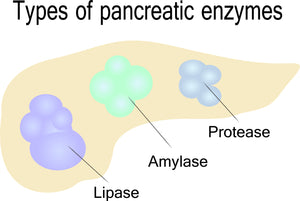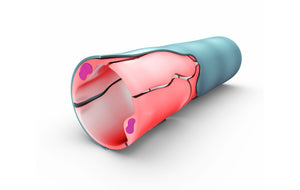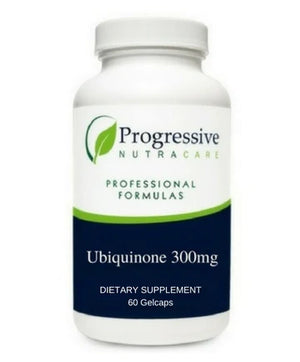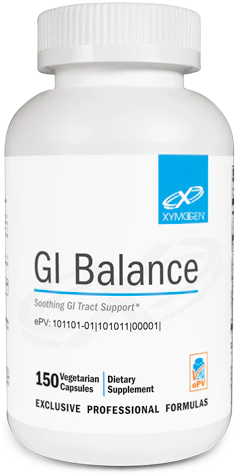Balance Is The Key To a Healthy Estrogen Cycle

Estrogen is a sex hormone necessary for maintaining sexual and reproductive health. It plays a role in ovulation (when your ovaries release an egg) and thickens the lining of your uterus (endometrium) to prepare it for pregnancy. Estrogen peaks in the days leading up to ovulation, which is your most fertile period. Estrogen levels naturally fluctuate during your menstrual cycle and decline during menopause. The menstrual cycle exists in three phases: the follicular phase (before the release of the egg), the ovulatory phase (egg release), and the luteal phase (after the release of the egg). Estrogen levels peak in the later part of the follicular phase and go up again in the luteal stage. That’s how the estrogen cycle operates when everything is normal. How can things go wrong, and get out of balance?
Estrogen, along with hormones made in your brain (FSH and LH), and progesterone, play an important part in your menstrual cycle. These hormones coexist in a delicate balance, and that balance is necessary to keep your periods regular. Consistently high or low levels of estrogen may signal trouble. Since estrogen also has other functions in both men and women, such as regulating cholesterol, protecting bone health, and influencing mood, heart health, skin, and hair, it pays to keep an eye on estrogen levels and your estrogen balance.
Men have estrogen as well, and in their case, rather than just being balanced with progesterone, estrogen is also balanced with testosterone. While women produce testosterone, it’s usually in far lower quantities than what is produced by males, although testosterone is still important for women as well. Testosterone naturally decreases as men age, while estrogen increases. Testosterone needs to stay in balance with estrogen in the male body in order to help control sex drive, the ability to have an erection, and the production of sperm. In men, testosterone dictates the development of primary and secondary sex characteristics. In men and women, testosterone is needed to grow muscle mass and improve spinal bone strength.
An imbalanced estrogen cycle can have several impacts on the body:
1) Menstrual Cycle Disruptions: Imbalances in estrogen and progesterone can cause disruptions in the menstrual cycle.
2) Mood Changes: Hormonal imbalances can lead to mood changes.
3) Hot Flashes: Imbalances in estrogen levels can cause hot flashes, a common symptom of menopause.
4) Infertility: Hormonal imbalances can affect fertility and may make it more difficult to conceive.
5) Cancers: Imbalances in estrogen and progesterone can impact hormone receptor-positive (HR-positive or HR+) cancers.
6) Other Conditions: Excess estrogen in your body can be associated with multiple conditions such as polyps, fibroids, PCOS, endometriosis pain, ovarian tumors, etc.
Balancing hormones naturally involves a combination of lifestyle changes and dietary habits. Here are some ways to help balance your hormones in these ways:
- Eat enough protein at every meal: Consuming adequate amounts of protein is necessary to provide the essential amino acids that your body can’t make on its own Some of your hormones are protein-derived, such as Growth Hormone, Prolactin (which stimulates milk production), and Follicle-Stimulating Hormone (which stimulates the maturation of eggs and sperm).
- Engage in regular exercise: Physical activity strongly influences hormonal health. Exercise increases dopamine (which decreases stress and helps you feel good), stimulates the release of serotonin (which positively impacts mood, social behavior, appetite, digestion, memory, and sexual function, and sleep).
- Get consistent, high-quality sleep: Getting enough sleep is crucial for hormone balance. Many hormones are released or regulated during sleep, including Growth Hormone, Insulin, Cortisol, thyroid hormones, melatonin, estrogen and progesterone.
- Manage stress: Chronic stress can cause hormonal imbalances. Techniques such as meditation, yoga, deep breathing, and other stress-reducing activities can help manage stress levels.
- Maintain a healthy weight: Being overweight can lead to hormone imbalances, disrupt your metabolic system in general, and contributes to your risk for diabetes and other ailments that ultimately affect hormones as well.
- Eat a healthy diet: A nutritious diet rich in protein and fiber can help naturally balance your hormones. Certain foods are known to support hormone function, such as salmon and shellfish, leafy greens, and sweet potatoes.
In addition to these lifestyle and diet changes, there has been research into natural botanicals that can help balance your hormones to keep healthy amounts of estrogen, progesterone, and testosterone in the body so that everything functions smoothly.
- Turmeric extract- Curcuminoids, the active compounds in turmeric, have been studied for their potential effects on hormone regulation. Here’s what the research suggests: Curcuminoids may help regulate and support estrogen hormone levels, both directly and indirectly. They are structurally and functionally similar to mammalian estrogens and can bind to estrogen receptors. This could potentially help balance estrogen levels in the body. Turmeric is also a natural source of phytoestrogens, which can help replenish estrogen levels in the body and reduce symptoms of menopause. While there’s limited direct research on curcuminoids’ impact on progesterone, one study found that curcuminoids reduced the force and frequency of induced contractions in the smooth muscles of rat uterus, which could potentially indicate an influence on progesterone levels. Progesterone plays a key role in regulating uterine contractions. Curcuminoids may help increase testosterone levels in several ways. They can block estrogen at a cellular level, increase the processing of cholesterol in the liver, activate vitamin D receptors, accelerate fat loss, promote healthy testicular leydig cell functionality, and improve insulin sensitivity. However, it’s important to note that high doses of turmeric might lower testosterone levels and decrease sperm movement, which could potentially reduce fertility.
- DIM- Diindolylmethane (DIM) is a compound derived from the digestion of indole-3-carbinol, which is found in cruciferous vegetables such as broccoli, Brussels sprouts, cabbage, and kale. DIM has been studied for its potential effects on hormone regulation, particularly estrogen, progesterone, and testosterone. DIM may help regulate estrogen levels by promoting a healthier estrogen metabolism and helping the body to break down estrogen into its beneficial or “good” metabolites. These metabolites have antioxidant properties and help to maintain a healthy cell cycle. Additionally, DIM can help to reduce the levels of harmful estrogen metabolites, which are associated with an increased risk of obesity, breast cancer and other health conditions. While there’s limited direct research on DIM’s impact on progesterone, it’s known that a balance between progesterone and estrogen is crucial for women’s health. By promoting a healthier estrogen metabolism, DIM could indirectly help maintain this hormonal balance. DIM may also influence testosterone levels. It’s known that estrogen and testosterone need to be in balance for optimal health. By promoting a healthier metabolism and breakdown of estrogen, DIM could potentially help maintain this balance.
- Black Pepper Extract- Black Pepper Extract, also known as Piperine, is a bioactive compound that is found in black pepper. It has been studied for its potential effects on hormone regulation, particularly estrogen, progesterone, and testosterone. While there isn’t much direct research on the impact of Black Pepper Extract on estrogen levels, some studies suggest that it may influence estrogen activity. For example, it has been found to enhance the bioavailability of curcumin, a compound found in turmeric that has been shown to have estrogenic activity. This means when taken together with curcuminoids it may have the ability to increase the bioactivity of those curcuminoids, and therefore their potential effects on hormone regulation. A study published in the Asian Pacific Journal of Tropical Biomedicine suggests that Black Pepper Extract may enhance the bioavailability of certain substances, which could potentially include hormones like testosterone. Again, the effect on curcuminoids could play a role as well in balancing hormones in males.
If you are experiencing symptoms of too much or too little estrogen, it may be to your benefit to alter your diet, exercise, control stress, and perhaps to try natural ingredients like Curcumin, DIM, and Black Pepper. In fact, there is an easy way to combine these into a supplement, with DIM 2:16, which includes all three of these natural substances.
- Tags: Article Diet and Exercise
- Robert Thomas







Comments 0